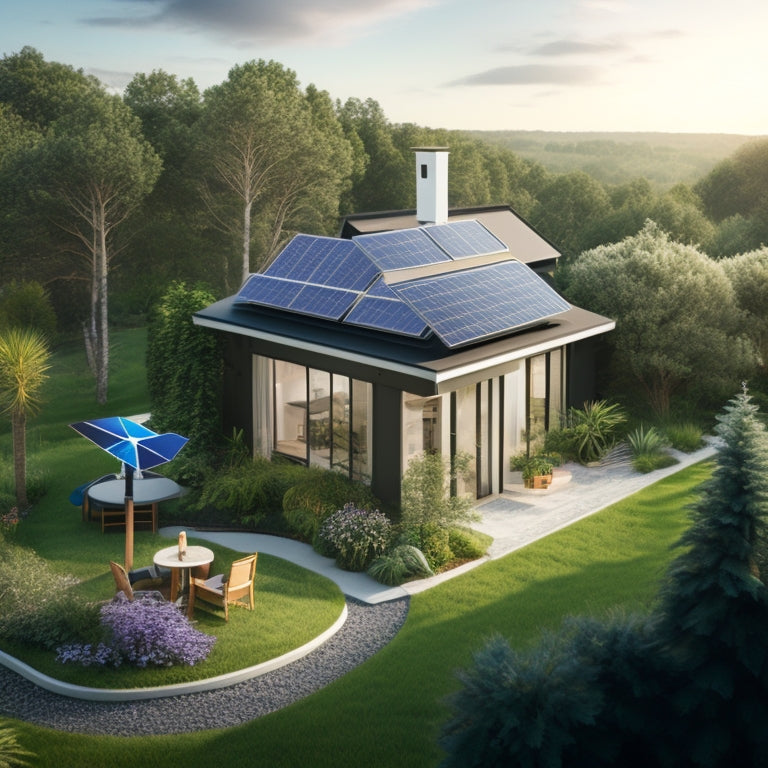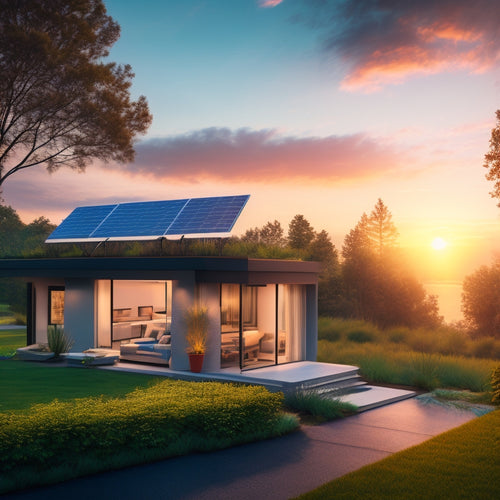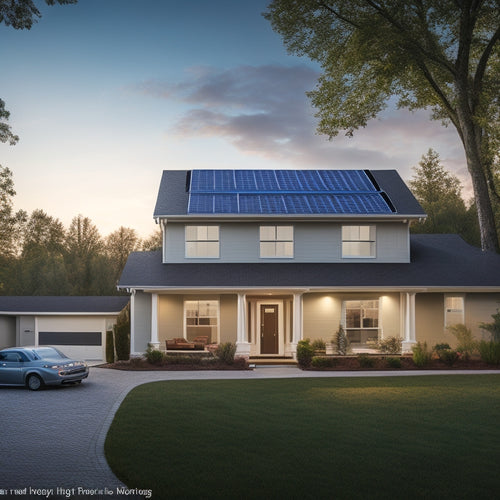
Power Your Home Off-Grid With Small Systems
Share
You can power your home off-grid with small solar systems customized to your specific energy needs, offering a cost-effective and environmentally friendly alternative to traditional energy sources. By understanding your daily energy consumption, you can identify areas for improvement and optimize energy usage. Small solar panel systems provide energy independence, reduce reliance on the grid, and contribute to environmental preservation. To get started, consider your energy needs, assess your site's solar irradiance, and choose the right solar panels and battery selection for your system. From there, you'll be well on your way to utilizing the power of renewable energy and taking control of your energy future.
Key Takeaways
- Assess daily energy consumption to identify areas for improvement and optimize energy usage for off-grid living.
- Small solar panel systems offer low upfront costs, renewable energy, and energy independence from the grid.
- Choose the right solar panels by evaluating efficiency, system design, and site-specific conditions for optimal installation and performance.
- Properly size your solar power system by calculating energy requirements, evaluating local solar irradiance, and considering seasonal variations.
- Select and maintain the right battery type, ensuring proper charging system design, inverter and charge controller roles, and regular maintenance for reliable off-grid power.
Understanding Off-Grid Energy Needs
How much energy does your off-grid home actually need? To determine this, you'll need to assess your energy usage patterns and identify areas for improvement.
Start by calculating your daily energy consumption in watt-hours (Wh). Consider the appliances and devices you use, their power ratings, and the number of hours they're used daily. Be honest about your energy habits – every device counts, from refrigerators to smartphones.
Conduct an energy audit to identify inefficiencies and improvement opportunities, and employ tools like watt meters and energy monitoring software for data collection.
To reduce your energy needs, focus on energy efficiency and make lifestyle adjustments. Replace incandescent bulbs with LEDs, use power strips to eliminate standby power consumption, and adjust your daily habits to minimize energy waste.
Small Solar Panel System Benefits
When you opt for a small solar panel system, you'll benefit from low upfront costs, making it a more accessible option for those looking to shift to off-grid energy.
Additionally, you'll be contributing to climate action and supporting a more sustainable future by reducing your reliance on finite resources and minimizing your carbon footprint.
Perhaps most appealing, however, is the energy independence that comes with generating your own power, free from the constraints of traditional grid connections.
Low Upfront Costs
One of the most significant advantages of small solar panel systems is their relatively low upfront costs, making them an attractive option for those looking to power their homes off-grid. As you consider investing in a small solar panel system, you'll find that the initial investment is lower compared to traditional off-grid power solutions. This is due to the smaller scale of the system, which reduces the overall cost.
-
Financing options, grant opportunities, and tax incentives can further offset the initial investment, making small solar panel systems a more affordable choice.
-
With a lower upfront cost, you can start enjoying cost savings and long-term benefits sooner, making it easier to fit into your budget planning.
-
An affordability analysis will show that small solar panel systems provide a more economical option for powering your home off-grid, making them a smart choice for those looking to reduce their reliance on the grid.
Renewable Energy Source
As you consider the benefits of small solar panel systems, the most significant advantage is that they employ a renewable energy source - sunlight. This means you're not relying on finite fossil fuels, reducing your carbon footprint and contributing to a cleaner environment.
In contrast, traditional energy sources are depleting natural resources, harming the ecosystem. Small solar panel systems can be combined with other renewable energy sources, like wind energy or hydropower potential, to create a hybrid system.
This diversification guarantees a reliable energy supply, even when one source isn't generating power. By utilizing renewable energy, you're not only powering your home off-grid but also playing an essential role in preserving the planet's natural resources for future generations.
Energy Independence
Your small solar panel system enables you to break free from the grid, granting you energy independence that's unparalleled in traditional energy setups.
This means you're no longer reliant on the grid's fluctuations, outages, or rate hikes. You're in control, enjoying energy autonomy and a sustainable lifestyle.
-
You're immune to power outages, ensuring your essential appliances remain operational.
-
You can reduce your energy bills considerably, or even eliminate them.
-
You're contributing to a cleaner environment, reducing your carbon footprint and reliance on fossil fuels.
Choosing the Right Solar Panels
By now, you've likely decided to employ the power of solar energy to fuel your off-grid home, and selecting the right solar panels is an important step in this process.
When choosing solar panels, evaluate panel efficiency, which affects how much energy you'll generate per hour of sunlight. Higher-efficiency panels produce more power per unit area, but may cost more.
It's also essential to evaluate the overall system design, including grid connection and energy management, to guarantee a reliable and efficient off-grid system.
Ideal site selection is also significant, taking into account factors such as shading, wind direction, and snow loads, to determine the best mounting option for your off-grid home.
You'll also need to decide on mounting options, such as roof-mounted, ground-mounted, or tracking systems. Each has its pros and cons, including cost, installation complexity, and maintenance requirements.
Assess your site's specific conditions to determine the best mounting option for your off-grid home.
Sizing Your Solar Power System
Determine how much power you need to generate by sizing your solar power system correctly. This involves calculating your energy requirements, factoring in your energy usage patterns and the local solar irradiance. A well-sized system guarantees you generate enough power to meet your needs while avoiding oversizing, which can be costly.
-
Consider your energy load: Calculate the total wattage of your appliances and devices to determine your energy requirements.
-
Assess your solar resource: Evaluate the amount of sunlight your location receives to determine the required solar panel efficiency.
-
Choose compatible energy storage solutions: Select batteries that can store excess energy generated during the day for use during the night or on cloudy days.
Battery Selection and Maintenance
You'll need to select the right battery type for your off-grid system, considering options like lead-acid, lithium-ion, or saltwater batteries, each with its own advantages and limitations.
Proper deep cycle maintenance is essential to extend the lifespan of your batteries, and you'll need to develop a routine to monitor and adjust their state of charge, voltage, and temperature.
When designing your charging system, you'll also need to guarantee it's optimized to work efficiently with your chosen battery type and solar power system.
Battery Type Options
Your off-grid power system's backbone is its battery bank, and selecting the right battery type is essential for reliable, efficient, and cost-effective performance.
You'll need to evaluate factors like battery lifespan, energy density, and temperature effects when choosing between lithium batteries and lead acid batteries.
-
Lithium batteries offer higher energy density and longer lifespans, but come at a higher cost.
-
Lead acid batteries are more affordable, but have lower energy density and shorter lifespans.
-
Both types have varying discharge rates and cycle efficiency, which affect overall system performance.
Remember to research and weigh these factors carefully to select the best battery type for your off-grid power system.
Deep Cycle Maintenance
Properly maintained deep cycle batteries are essential to the longevity and reliability of your off-grid power system.
You'll want to prioritize deep cycle care to guarantee your batteries perform at their best. Regularly check your batteries' state of charge, voltage, and temperature to identify potential issues early on.
Make certain to keep your batteries clean, dry, and secure, as corrosion and physical damage can greatly reduce battery longevity.
You should also equalize your batteries periodically to prevent sulfation and maintain their overall health.
Charging System Design
When designing your off-grid power system's charging system, regularly evaluating your battery needs is essential to confirm peak performance and longevity. This involves selecting the right battery type and size for your specific energy requirements.
-
Assess your energy usage patterns to determine the ideal battery capacity and configuration for your system.
-
Consider factors like depth of discharge, cycle life, and maintenance requirements to guarantee system optimization.
-
Implement energy management strategies, such as monitoring and controlling charge/discharge rates, to prolong battery life and reduce energy waste.
Inverter and Charge Controller Roles
Operating off-grid requires a significant comprehension of the vital components that convert and manage energy in your system.
You'll need to understand the roles of inverters and charge controllers, which are essential for a seamless off-grid experience. Inverters convert DC power from your solar panels or batteries to AC power for your home.
You'll choose from various inverter types, such as string inverters, microinverters, or power optimizers, each with their own advantages.
Charge controllers, on the other hand, regulate the flow of energy from your solar panels to your batteries, guaranteeing efficient charging.
Look for charge controllers with high efficiency ratings to minimize energy loss.
Installation and Safety Considerations
Several essential steps must be taken to guarantee a safe and efficient installation of your off-grid energy system.
You'll need to follow installation guidelines and safety protocols to avoid electrical shock, fire hazards, and equipment damage.
-
Make sure your system is designed and installed by a qualified professional who follows industry standards and local building codes.
-
Conduct regular maintenance checks to identify and address potential issues before they become major problems.
-
Implement safety features such as surge protectors, grounding systems, and overcurrent protection devices to prevent electrical faults and guarantee safe operation.
Frequently Asked Questions
Can I Use Off-Grid Power for My Entire Neighborhood?
You can investigate neighborhood energy solutions, like community solar or shared resources, but first, you'll need to research local regulations and rally collective investment from your community to achieve energy independence.
Are Off-Grid Systems Compatible With Local Building Codes?
You'll need to guarantee your off-grid system complies with local building codes by obtaining necessary building permits and meeting energy regulations, which vary by region, so it's crucial to research and consult with local authorities before installation.
Do I Need Permission to Install an Off-Grid System?
You think you're breaking free from the grid, but surprise! You'll likely need permission to install an off-grid system, as local regulations often require installation permits to guarantee safety and compliance with building codes.
Can I Sell Excess Energy Back to the Grid?
You can sell excess energy back to the grid through net metering options or energy buyback programs, which allow you to feed surplus power into the grid and offset your energy bills or receive credits.
Will an Off-Grid System Increase My Property Value?
You'll likely see an increase in property value, as an off-grid system adds a unique appeal, offering benefits like energy independence and reduced utility bills, making your property more attractive to potential buyers.
Related Posts
-

Solar Phone Chargers for Camping Essentials
Solar phone chargers are must-haves for your camping essentials, allowing you to stay connected while enjoying nature...
-

The Future of Residential Energy Storage
The future of residential energy storage looks promising and cost-effective for you. With lithium-ion battery prices ...
-

Cost of Solar With Battery Backup
You're investing in a solar panel system with battery backup to guarantee reliable power during outages. The cost of ...


